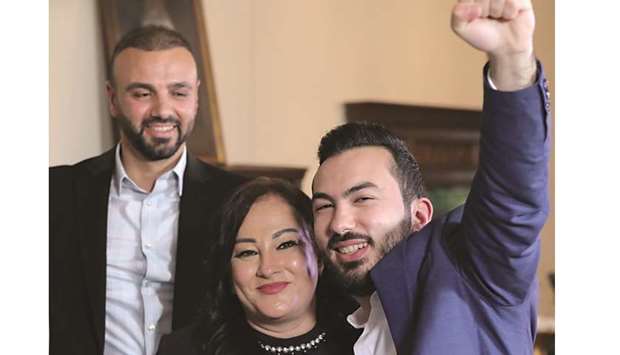Lebanese engineer named top innovator after receiving 54.8% of the vote
Wadah Malaeb has spent many years trying to turn his dream into a reality, and last night – after winning Season 12 of Stars of Science — he has proven that nothing can stand in the way of ambition and determination, even when faced with unprecedented challenges.
The 26-year-old Lebanese engineer claimed the title of top Arab innovator on the Qatar Foundation TV show, after winning over the jury members and viewers and receiving 54.8% of the vote with his innovation Ductal Organoid-on-a-Chip.
His project provides a suitable environment that replicates real human conditions, enabling crucial prototype drug testing to be conducted efficiently and affordably. Malaeb, who is in Baissour and learned about his win via a virtual ceremony, says: “I am delighted. I want to thank everyone who believed in my project and voted for me.
“There is no other programme like it. Stars of Science’ provided me with the platform to succeed and helped me turn my idea into a tangible model — from the experts who provided critical feedback, to the equipment and supplies that allowed me to build the prototype.
“Three months on Stars of Science is the equivalent to working three years outside in the real world. “I plan to continue developing the product, establish an industrial pipeline, and work with research institutions to test and perfect the innovation.”
In a season filled with challenges brought on by the pandemic, Malaeb explains that when he applied for Season 12, Covid-19 was primarily in China, and that he did not think that it would reach the Arab world – or spread across the globe in such a short space of time.
Learning to adapt to change was one of the many skills Malaeb learned during his time on the show. “I was presented with challenges, as many institutions and research centres that my project was dependent on closed their doors to me. However, with the support of Stars of Science, I was able to overcome this barrier, and anticipate the reactions of institutions, so was able to change my plans and adapt accordingly,” he explains.
“Ultimately, Qatar Foundation and Stars of Science provided the necessary support to us — the contestants — to present our ideas and develop them, and because of this we were able to complete what we started, and this is an achievement in itself.”
“I would like to encourage aspiring innovators to apply for Stars of Science, to search for solutions to challenges that face our societies and learn how we can better address them. Even if they do not have sufficient experience in a specific field, they will receive the necessary support from the programme,” he says.
Malaeb attributes his success to his family. And Wadah’s mother Hilana could not hide her joy at her son’s win. “The greatest joy for any mother is to see her child succeed. My feeling today is indescribable,” she explains.
“I have always been proud of him — ever since he was a child. He has always been a hard worker, and his success — and reaching this stage — is the most beautiful gift we could receive. I am sure that if his father were still here today, he would be so proud of him — he was always saying what a bright future he has.”
Wadah’s brother Wiam adds: “The support that Wadah received over the course of the show — whether from the programme or from the audience – made us all unbelievably happy. From the moment I learned he was going to appear on the programme, I became was one of his biggest supporters – I had no doubts about his success.
“I am delighted to see my brother achieve his goals and reap the fruits of years of hard work. Wadah is ambitious, and always strives to succeed. I hope that his project succeeds to the level he aspires it to.”

Wadah Malaeb, winner of this year’s Stars of Science, with his family.
